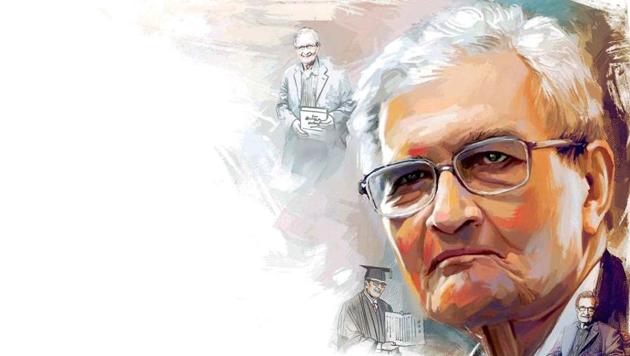Amartya Sen: Humane Face of Economics
This Nobel laureate, writer and philosopher has made a mark with his commitment to ending poverty, deprivation and his role in creation of the UN Human Development Index.
Sen was born on November 3, 1933, in Santiniketan, to Amita Sen and Ashutosh Sen, professor at the Dhaka University who was also the chairman of the West Bengal Public Service Commission.

Named Amartya by Tagore, Sen’s formal education began at the St Gregory’s School in Dhaka in 1940. The following year, he was enrolled at Patha Bhavan, the primary and secondary wing of Santiniketan. He graduated in Economics from the Presidency College, Calcutta in 1953. That year, he joined the Trinity College in Cambridge, where he earned another Bachelor of Arts degree in Economic Sciences.
Career
At 23, Sen was appointed professor and head of the economics department at the Jadavpur University in Calcutta. After two years, he returned to Cambridge to pursue PhD. In 1959, he submitted the PhD thesis titled The Choice of Techniques, and soon became a visiting Professor at the Massachusetts Institute of Technology.
Between 1963 and 1971, he was the professor of economics at the Delhi School of Economics (where he completed his magnum opus Collective Choice and Social Welfare in 1969). He also taught at the University of Calcutta. From 1977 to 1988, he taught at the University of Oxford, where he was first a Professor of Economics and Fellow of Nuffield College, and then Drummond Professor of Political Economy and a Fellow of All Souls College, Oxford from 1980.
In 1987, Sen became the Thomas W Lamont professor of economics at Harvard. In 1998, he was appointed Master of Trinity College, Cambridge, making him the first Asian head of an Oxbridge college. In January 2004, Sen returned to Harvard.
In 2007, he was appointed the chairman of Nalanda Mentor Group to build the framework of international cooperation and proposed structure of partnership that would govern the establishment of Nalanda International University Project as an international centre of education seeking to revive the ancient centre of higher learning which was present in India from the 5th century to 1197.
On July 19, 2012, Sen was named the first chancellor of the proposed Nalanda University. Teaching began in August 2014. On February 20, 2015, Sen withdrew his candidature for a second term.
Research and Books
Sen’s research works cover a wide range of subjects from social choice theory, economic theory, ethics and political philosophy, welfare economics, theory of measurement, decision theory, development economics, public health to gender studies.
His books have been translated in more than 30 languages. Some of his noteworthy publications include Choice of Techniques, Growth Economics, Collective Choice and Social Welfare, Development as Freedom, Poverty and Famines: An Essay on Entitlements and Deprivation, On Economic Inequality, The Argumentative Indian and The Idea of Justice.
Awards
Besides the 1998 Nobel for Economics, he is also the recipient of the Bharat Ratna, Adam Smith Prize, Commandeur de la Legion d’Honneur, Honorary Companion of Honour,Edinburgh Medal, Aztec Eagle and Eisenhower Medal.
Interesting Facts:
1. Amartya Sen has been called the Mother Teresa of Economics for his work on famine, human development, welfare economics, the underlying mechanisms of poverty, gender inequality, and political liberalism.
2. A 56-minute documentary titled Amartya Sen: A Life Re-examined directed by Suman Ghosh details his life and work. It focuses on Welfare Economics and Social Welfare Theory that won Sem the Nobel in 1998.
3. Sen has been a permanent resident of the US for almost 50 years but chooses to retain only his Indian citizenship. He usually spends his winter holidays at his home in Santiniketan.
4. Sen’s interest in famine, which was one of his main research subjects, was sparked by personal experience wherein as a nine-year-old, he witnessed the Bengal famine of 1943, in which three million people perished. The loss of life on such a huge magnitude was unnecessary, Sen concluded later. Based on research, Sen identified panic buying, hoarding and British military acquisition, among factors behind the famine.
Sources: Wikipedia, thefamouspeople.com



